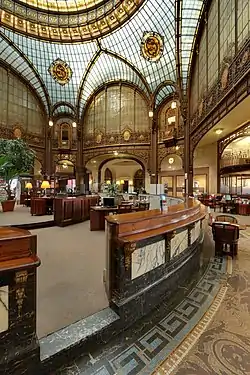Jacques Hermant
Jacques-René Hermant (7 May 1855 in Paris, France – 5 June 1930 in France) was a French architect, one of the most renowned architects of fin-de-siècle Paris.

Born in Paris, the son of the architect Achille Hermant (1823-1903), Hermant was educated at the École des Beaux-Arts under Joseph Auguste Émile Vaudremer. He was a rationalist architect, but was a strong advocate for the neoromanticism style of the time, preferably the style of Louis XIII. Hermant became an advocate for concrete construction and erected two of the first reinforced concrete buildings in Paris, collaborating with the French engineer Edmond Coignet (1856–1915), who patented his system in 1892.
Hermant was a professor at the École des Beaux-Arts in Paris and served as chief architect for the city. He employed the Danish architect Hack Kampmann during Kampmann's stay in Paris in 1883.
Significant buildings
- the French pavilion for the World's Columbian Exposition, Chicago, 1893
- the French pavilion for the Exposition Internationale, Brussels, 1897
- La Caserne des Célestins, Paris, 1895–1901. Home of the cavalry of the French Republican Guard.
- Le Magasin des Classes Laborieuses, department store, reinforced concrete (with Coignet), Paris, 1899
- La Salle Gaveau, concert hall for the piano firm, reinforced concrete (with Coignet), Paris, 1905
- Société Générale, office building, Blvd. Haussmann, Paris, 1907
Honours
- Second Grand Prix de Rome, 1880
- Commander Légion d'honneur, 1929
References
- Balteau, J. (editor), Dictionnaire de biographie française, 1933.
- 'Livraisons d'histoire de l'architecture, 2003, Vol. 6, Number 1, p. 47–67.